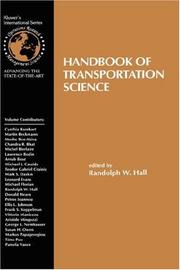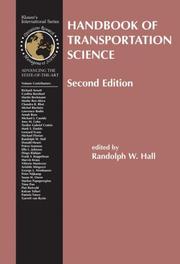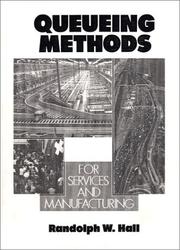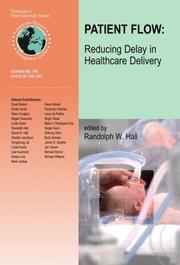| Listing 1 - 9 of 9 |
Sort by
|
Book
ISBN: 1280634472 9786610634477 0387336362 Year: 2006 Volume: 91 Publisher: New York ; [Great Britain] : Springer,
Abstract | Keywords | Export | Availability | Bookmark
 Loading...
Loading...Choose an application
- Reference Manager
- EndNote
- RefWorks (Direct export to RefWorks)
Patient Flow: Reducing Delay in Healthcare Delivery is dedicated to improving healthcare through reducing the delays experienced by patients. One aspect of this goal is to improve the flow of patients, so that they do not experience unnecessary waits as they flow through a healthcare system. Another aspect is ensuring that services are closely synchronized with patterns of patient demand. Still another aspect is ensuring that ancillary services, such as housekeeping and transportation, are fully coordinate with direct patient care. It is the first book treatment to have reduction in patient delay as its sole focus, and therefore, provides the foundation by which hospitals can implement change. Reflecting the highly interdisciplinary and practitioner nature of this book, the chapters have been written by doctors, nurses, industrial engineers, system engineers and geographers, and thus, these perspectives provide the comprehensive view needed to address the problem of patient delay.
Health care reform. --- Health services administration. --- Medical care. --- Delivery of health care --- Delivery of medical care --- Health care --- Health care delivery --- Health services --- Healthcare --- Medical and health care industry --- Medical services --- Personal health services --- Public health --- Health administration --- Health care administration --- Health care management --- Health sciences administration --- Health services management --- Medical care --- Health planning --- Public health administration --- Health reform --- Health system reform --- Healthcare reform --- Medical care reform --- Reform of health care delivery --- Reform of medical care delivery --- Medical policy --- Health insurance --- Administration --- Management --- Practice of medicine. --- Internal medicine. --- Emergency medicine. --- Operations research. --- Organization. --- Medicine. --- Health Administration. --- Internal Medicine. --- Emergency Services. --- Operations Research/Decision Theory. --- Medicine/Public Health, general. --- Clinical sciences --- Medical profession --- Human biology --- Life sciences --- Medical sciences --- Pathology --- Physicians --- Organisation --- Operational analysis --- Operational research --- Industrial engineering --- Management science --- Research --- System theory --- Medicine, Emergency --- Medicine --- Critical care medicine --- Disaster medicine --- Medical emergencies --- Medicine, Internal --- Medical practice --- Practice of medicine --- Physician practice acquisitions --- Health Workforce --- Health administration. --- Decision making. --- Planning. --- Creation (Literary, artistic, etc.) --- Executive ability --- Organization --- Deciding --- Decision (Psychology) --- Decision analysis --- Decision processes --- Making decisions --- Management decisions --- Choice (Psychology) --- Problem solving --- Decision making

ISBN: 079238587X 1461373700 1461552036 9780792385875 Year: 1999 Publisher: Boston Kluwer
Abstract | Keywords | Export | Availability | Bookmark
 Loading...
Loading...Choose an application
- Reference Manager
- EndNote
- RefWorks (Direct export to RefWorks)
Over the past thirty-five years, a tremendous body of both theoretical and empirical research has been established on the `science of transportation'. The Handbook of Transportation Science has collected and synthesized this research into a systematic treatment of this field covering its fundamental concepts, methods, and principles. The purpose of this handbook is to define transportation as a scientific discipline that transcends transportation technology and methods. Whether by car, truck, airplane - or by a mode of transportation that has not yet been conceived - transportation obeys fundamental properties. The science of transportation defines these properties, and demonstrates how our knowledge of one mode of transportation can be used to explain the behavior of another. Transportation scientists are motivated by the desire to explain spatial interactions that result in movement of people or objects from place to place. Its methodologies draw from physics, operations research, probability and control theory. It is fundamentally a quantitative discipline, relying on mathematical models and optimization algorithms to explain the phenomena of transportation. The fourteen chapters in the handbook are written by the leading researchers in transportation science in an effort to define and categorize for the first time the scientific nature and state of the art of the field. As such, it is directed to the broader research community, transportation practitioners, and future transportation scientists.
Transport. Traffic --- Transportation --- Research --- Research. --- Operations research. --- Decision making. --- Regional economics. --- Spatial economics. --- Industrial organization. --- Operations Research/Decision Theory. --- Regional/Spatial Science. --- Industrial Organization. --- Industries --- Organization --- Industrial concentration --- Industrial management --- Industrial sociology --- Spatial economics --- Economics --- Regional economics --- Regional planning --- Regionalism --- Space in economics --- Deciding --- Decision (Psychology) --- Decision analysis --- Decision processes --- Making decisions --- Management --- Management decisions --- Choice (Psychology) --- Problem solving --- Operational analysis --- Operational research --- Industrial engineering --- Management science --- System theory --- Decision making --- Economics. --- Economic theory --- Political economy --- Social sciences --- Economic man --- Transportation - Research

ISBN: 1402072465 9781402072468 9780306480584 9786610462223 1280462221 0306480581 Year: 2003 Publisher: Boston Kluwer
Abstract | Keywords | Export | Availability | Bookmark
 Loading...
Loading...Choose an application
- Reference Manager
- EndNote
- RefWorks (Direct export to RefWorks)
Over the past thirty-five years, a substantial amount of theoretical and empirical scholarly research has been developed across the discipline domains of Transportation. This research has been synthesized into a systematic handbook that examines the scientific concepts, methods, and principles of this growing and evolving field. The Handbook of Transportation Science outlines the field of transportation as a scientific discipline that transcends transportation technology and methods. Whether by car, truck, airplane - or by a mode of transportation that has not yet been conceived - transportation obeys fundamental properties. The science of transportation defines these properties, and demonstrates how our knowledge of one mode of transportation can be used to explain the behavior of another. Transportation scientists are motivated by the desire to explain spatial interactions that result in movement of people or objects from place to place. Its methodologies draw from physics, operations research, probability and control theory.
Transport. Traffic --- Transportation --- Research. --- Business & Economics --- Management --- Sociology & Social History --- Social Sciences --- Communities - Urban Groups --- Management Theory --- Transportation Economics --- Research --- 656 --- Transport. Verkeer

ISBN: 0137447566 Year: 1991 Publisher: Englewood Cliffs (N.J.): Prentice Hall
Abstract | Keywords | Export | Availability | Bookmark
 Loading...
Loading...Choose an application
- Reference Manager
- EndNote
- RefWorks (Direct export to RefWorks)
Manufactures --- Queuing theory --- Service industries --- Produits manufacturés --- Files d'attente, Théorie des --- Services (Industrie) --- Management --- Mathematical models --- Gestion --- Modèles mathématiques --- 519.872 --- 658.513 --- -Manufacturing industries --- -Industries --- Industries --- Erlang traffic formula --- Queueing theory --- Theory of queues --- Waiting-line theory --- Production scheduling --- Stochastic processes --- Queuing theory. Service systems. Numerical simulation --- Supervision of production work. Follow-up, progressing, expediting. Scheduling --- -Mathematical models --- Manufacturing industries --- Queuing theory. --- Mathematical models. --- -Queuing theory. Service systems. Numerical simulation --- 658.513 Supervision of production work. Follow-up, progressing, expediting. Scheduling --- 519.872 Queuing theory. Service systems. Numerical simulation --- -Erlang traffic formula --- Produits manufacturés --- Files d'attente, Théorie des --- Modèles mathématiques --- Management&delete&
Book
ISSN: 08848289 ISBN: 9781461417330 1461417333 1489997199 9786613445742 1461417341 1283445743 Year: 2012 Volume: 168 Publisher: New York : Springer Science+Business Media, LLC,
Abstract | Keywords | Export | Availability | Bookmark
 Loading...
Loading...Choose an application
- Reference Manager
- EndNote
- RefWorks (Direct export to RefWorks)
This edited volume captures and communicates the best thinking on how to improve healthcare by improving the delivery of services -- providing care when and where it is needed most -- through application of state-of-the-art scheduling systems. Over 12 chapters, the authors cover aspects of setting appointments, allocating healthcare resources, and planning to ensure that capacity matches needs for care. A central theme of the book is increasing healthcare efficiency so that both the cost of care is reduced and more patients have access to care. This can be accomplished through reduction of idle time, lessening the time needed to provide services and matching resources to the needs where they can have the greatest possible impact on health. Within their chapters, authors address: (1) Use of scheduling to improve healthcare efficiency. (2) Objectives, constraints and mathematical formulations. (3) Key methods and techniques for creating schedules. (4) Recent developments that improve the available problem solving methods. (5) Actual applications, demonstrating how the methods can be used. (6) Future directions in which the field of research is heading. Collectively, the chapters provide a comprehensive state-of-the-art review of models and methods for scheduling the delivery of patient care for all parts of the healthcare system. Chapter topics include setting appointments for ambulatory care and outpatient procedures, surgical scheduling, nurse scheduling, bed management and allocation, medical supply logistics and routing and scheduling for home healthcare. .
Health services administration --- Medical appointments and schedules --- Health planning --- Health Services Administration --- Appointments and Schedules --- Health Planning --- Models, Organizational --- Personnel Staffing and Scheduling --- Health services administration. --- Health planning. --- Comprehensive health planning --- Health care planning --- Health services planning --- Medical care --- Medical care planning --- Public health --- Health administration --- Health care administration --- Health care management --- Health sciences administration --- Health services management --- Planning --- Administration --- Management --- Business. --- Operations research. --- Decision making. --- Health administration. --- Management science. --- Business and Management. --- Operation Research/Decision Theory. --- Health Administration. --- Operations Research, Management Science. --- Medical policy --- Public health administration --- Practice of medicine. --- Operations Research/Decision Theory. --- Medical practice --- Practice of medicine --- Physician practice acquisitions --- Operational analysis --- Operational research --- Industrial engineering --- Management science --- Research --- System theory --- Quantitative business analysis --- Problem solving --- Operations research --- Statistical decision --- Deciding --- Decision (Psychology) --- Decision analysis --- Decision processes --- Making decisions --- Management decisions --- Choice (Psychology) --- Decision making --- Public health administration.

ISBN: 9780387336350 9780387336367 0387336354 0387336362 9786610634477 1280634472 Year: 2006 Volume: 91 Publisher: New York Springer
Abstract | Keywords | Export | Availability | Bookmark
 Loading...
Loading...Choose an application
- Reference Manager
- EndNote
- RefWorks (Direct export to RefWorks)
Patient Flow: Reducing Delay in Healthcare Delivery is dedicated to improving healthcare through reducing the delays experienced by patients. One aspect of this goal is to improve the flow of patients, so that they do not experience unnecessary waits as they flow through a healthcare system. Another aspect is ensuring that services are closely synchronized with patterns of patient demand. Still another aspect is ensuring that ancillary services, such as housekeeping and transportation, are fully coordinate with direct patient care. It is the first book treatment to have reduction in patient delay as its sole focus, and therefore, provides the foundation by which hospitals can implement change. Reflecting the highly interdisciplinary and practitioner nature of this book, the chapters have been written by doctors, nurses, industrial engineers, system engineers and geographers, and thus, these perspectives provide the comprehensive view needed to address the problem of patient delay.
Health services administration --- Medical appointments and schedules --- Medical care --- Appointments and schedules (Medicine) --- Schedules, Medical --- Hospitals --- Medical offices --- Medicine --- Scheduling --- Health administration --- Health care administration --- Health care management --- Health sciences administration --- Health services management --- Health planning --- Public health administration --- Delivery of health care --- Delivery of medical care --- Health care --- Health care delivery --- Health services --- Healthcare --- Medical and health care industry --- Medical services --- Personal health services --- Public health --- Administration --- Practice --- Management --- Health services administration. --- Medical appointments and schedules. --- Medical care.
Book
ISBN: 0137481128 Year: 1991 Publisher: London Prentice-Hall
Abstract | Keywords | Export | Availability | Bookmark
 Loading...
Loading...Choose an application
- Reference Manager
- EndNote
- RefWorks (Direct export to RefWorks)
Operational research. Game theory --- operations research --- queueing theory
Digital
ISBN: 9780387336367 Year: 2006 Publisher: Boston, MA Springer Science+Business Media, LLC
Abstract | Keywords | Export | Availability | Bookmark
 Loading...
Loading...Choose an application
- Reference Manager
- EndNote
- RefWorks (Direct export to RefWorks)
Operational research. Game theory --- Hygiene. Public health. Protection --- Business policy --- Production management --- Computer. Automation --- volksgezondheid --- bedrijfsplanning --- bedrijfsorganisatie --- industrie --- medische informatica --- speltheorie --- operationeel onderzoek
Book
ISBN: 9780387336367 Year: 2006 Publisher: Boston, MA Springer Science+Business Media, LLC
Abstract | Keywords | Export | Availability | Bookmark
 Loading...
Loading...Choose an application
- Reference Manager
- EndNote
- RefWorks (Direct export to RefWorks)
Patient Flow: Reducing Delay in Healthcare Delivery is dedicated to improving healthcare through reducing the delays experienced by patients. One aspect of this goal is to improve the flow of patients, so that they do not experience unnecessary waits as they flow through a healthcare system. Another aspect is ensuring that services are closely synchronized with patterns of patient demand. Still another aspect is ensuring that ancillary services, such as housekeeping and transportation, are fully coordinate with direct patient care. It is the first book treatment to have reduction in patient delay as its sole focus, and therefore, provides the foundation by which hospitals can implement change. Reflecting the highly interdisciplinary and practitioner nature of this book, the chapters have been written by doctors, nurses, industrial engineers, system engineers and geographers, and thus, these perspectives provide the comprehensive view needed to address the problem of patient delay.
Operational research. Game theory --- Hygiene. Public health. Protection --- Business policy --- Production management --- Computer. Automation --- volksgezondheid --- bedrijfsplanning --- bedrijfsorganisatie --- industrie --- medische informatica --- speltheorie --- operationeel onderzoek
| Listing 1 - 9 of 9 |
Sort by
|

 Search
Search Feedback
Feedback About UniCat
About UniCat  Help
Help News
News